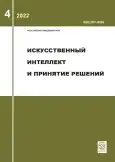Decision–Making in a Conflict Situation with Fuzzy Types of Participants
- Authors: Chernov V.G.1
-
Affiliations:
- Vladimir State University named after Alexander G. and Nikolai G. Stoletov
- Issue: No 4 (2022)
- Pages: 24-35
- Section: Optimal and Rational Choice
- URL: https://journal-vniispk.ru/2071-8594/article/view/270485
- DOI: https://doi.org/10.14357/20718594220403
- ID: 270485
Cite item
Full Text
Abstract
A method of solution of antagonistic game in violation of "common knowledge" principle is described, when players have incomplete knowledge about possible solutions and appropriate outcomes of the opposite side. As a formal model of a game situation it is proposed to use a fuzzy-multiple representation of estimates of possibilities of using by players their strategies and the corresponding consequences. The solution of this problem is based on the transformation of fuzzy estimates of the results of possible solutions for each situation in the form of an equivalent fuzzy set with a triangular identity function. The developed method does not impose restrictions on the affiliation functions of the initial fuzzy data. In addition to selecting the best solution, an estimation of its result and the degree of feasibility is obtained.
Keywords
About the authors
Vladimir G. Chernov
Vladimir State University named after Alexander G. and Nikolai G. Stoletov
Author for correspondence.
Email: vladimir.chernov44@mail.ru
Doctor of Economic Sciences, Professor
Russian Federation, VladimirReferences
- Myerson R.B. 1997. Game theory: analysis of conflict. London. Harvard: Harvard University Press. 584 p.
- Geanakoplos J. 1994. Common Knowledge. Handbook of Game Theory. v.2. ed. R. Aumann and S. Hart. Elsiever Science B.V. p.1438-1496.
- Harsanyi J. Games with incomplete information played “Bayesian players”. Management Science. 1967. Part 1. v. 14. №3. p.159-182, 1968.Part.II. v14. №5.p.320-334, 1968. Part III. v.14, № 7. p.486-502.
- Harsanyi J. 2001.A General Theory of Equlibrium Selection in Game. Moskva: «Ekonomicheskaya shkola», seriya Biblioteka «Ekonomicheskaya shkola». 424 p.
- Chkhartishvili A.G.2003. Bayes – Nash Equilibrium: Infinite – Deptth Point Information Structures. Automation and Remote Control. №12. P.105-111.
- Sigal A.V. Teoriya igr dlya prinyatiya e`konomicheskix reshenij. DIAJPI. Simferopol`. 2014. P.303.
- Butnariu D. 1978. Fuzzy games: a description of the concept. Fuzzy Sets and System. №1. P. 181-19.
- Seraya O.V., Katkova T.N. 2012. Zadacha teorii igr s nechetkoj platezhnoj matricej. Matematichni mashini i sistemi. № 3. P.29-36.
- Khalifa A. On Solving Two-Person Zero-Sum Fuzzy Matrix Games via Linear Programming Approach. // 27International Journal of Research in Industrial Engineering. 2019. Vol. 8. No. 1. P. 17–27.
- Iden H. H., Zainab S. A. A new proposed ranring function for solving fuzzy games // International Journal of Mathematics and Statistics Studies. October 2017. Vol.5. No.5, P.34–40.
- Khedekar M.D., Bapat M.S., Yadav S.N., Aher S.J. An application of fuzzy game theory to industrial decision making// Research Journal of Mathematical and Statistical Sciences. March (2017). Vol. 5(3). P. 9–12.
- Chaudhuri A. Solving Rectangular Fuzzy Games through // Open Comput. Sci. 2017.No. 7. P.46–50.
- Sasikumar S.V., Raju V. Study on Fuzzy Game Problem in Icosikaitetragonal Fuzzy Number // Annals of R.S.C.B. 2021. Vol. 25 Issue 6. P. 10500 – 10508.
- Gajalakshmi I.R. Solving Game Theory Using Reverse Order Pentagonal Fuzzy Numbers // Journal of Algebraic Statistics. 2022.Vol 13, No. 3. P. 1785–1790.
- Gupta N. U. Ch., Thakur N. I. Solving Game Problems involving Heptagonal and Hendecagonal Fuzzy Payoffs // International Journal of Innovative Technology and Exploring Engineering (IJITEE). July, 2019. Vol.8. Issue 9. P.2114–2120.
- Xia Zh., Hao S., X. Jin, Moses O. E. On characterization of equilibrium strategy for matrix games with L-R fuzzy payoffs // Journal of the Operations Research Society of Japan. 2021. Vol. 64. Issue 3. P.158–174.
- Yager R.R. Multiple-objective decision – making using a fuzz sets // International Journal. Man Machine Studies. 1977. Vol.9. №. 4. P.375–382.
- Yager R.R. Multicriteria decisions with soft: an application of fuzzy set and possibility theory // Fuzzy Mathematics. 1982. Vol.2. № 2. Pt.1. P.21–28; Vol.2. № 3. Pt.2. P.7–16.
- Chernov V.G. Choosing a Solution Based on Fuzzy Game with Nature. Journal of Applied Informatics. 2021. V. 16, №2(92). P. 131-142.
- Rao P.P.B., Shankar N.R. Ranking generalized fuzzy numbers using area, mode, spread and weight. 2012.International Journal of Applied Science and Engineering. №10. V.1 P.4157.
- Voroncov YA.A., MatveevM.G. Metody parametrizovannogo sravneniya nechetkih i trapecievidnyh chisel. 2014. Vestnik VGU, Seriya Sistemnyj analiz I informacionnye tekhnologi. №2. P.90-97.
- Ukhobotov V.I., Stabulit I.S., Kudryavtsev K.N. 2019. Comparison of triangular fuzzy numbers. Bulletin of Udmurt University. Mathematics, Mechanics, Computer Science. V. 29. issue 2. P.197-210.
- Balabanova E.A., Goncharova E.V. Ispol`zovanie teorii igr v sovremennom prinyatii reshenij // Koncept– Nauchno metodicheskij e`lektronny`j zhurnal. 2017.T.39. P.2051-2055.
- Leshhinskaya A.F., Podlepa V.A. Prinyatie reshenij ob investirovanii na osnove igrovy`x modelej sotrudnichestva i konkurencii. // E`konomika promy`shlennosti / Russian Journal of Industrial Economics. 2009. (2). P.41-47.
- Bojko A.A. Sposob analiticheskogo modelirovaniya boevy`x dejstvij // Sistemy` upravleniya svyazi i bezopasnosti. 2019. №2. P.1-27.
- Novikov D.A. Ierarxicheskie modeli voenny`x dejstvij //Upravlenie bol`shimi sistemami. 2012. Vy`p.37. P.1-38.
Supplementary files








